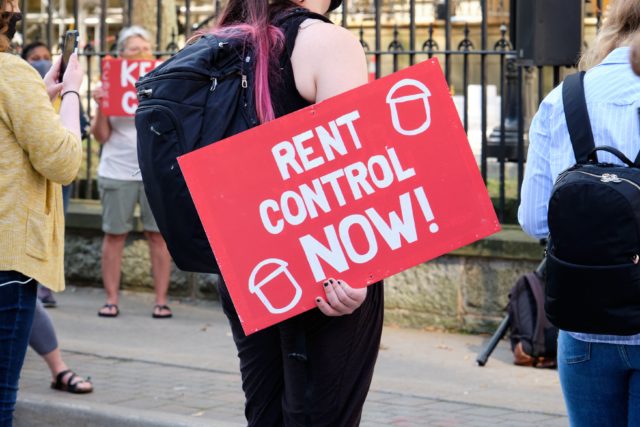
Returning to the evolving tenant’s movement in Boulder, my last column promised to delve further into the battle to obtain interest on deposits, and the warranty of habitability.
Interest on Deposits
In 1982 the Renter’s Rights Project first introduced the modest concept of getting interest on rental deposits (which includes security and damage deposits along with last month’s rent.) The city’s Human Rights Commission rejected that proposal that year—which required putting deposits into escrow accounts—after heavy lobbying by landlords.
After several years of inaction on the issue by the City Council, the newly reconstituted Boulder Tenants Unin decided to start a petition drive to put it on the city ballot in 1985. This is the first known instance of a tenant initiative being put to voters, which required landlords to pay tenants half the current prime rate, which at that time was 9.5% (which was later simplified to 5.5%) on their deposits.
It was an expensive campaign because the landlord lobby significantly outspent BTU—but newspapers endorsed it along with City Council candidates, and even the Boulder Board of Realtors (who normally opposed most tenant proposals).
It passed that year, by a significant margin.
Later, the City Council changed the rate to an average that matched a one year certificate of deposit.
Unless people are using the Boulder Model Lease (see Unrepentant Tenant, “Rent Control rallies and 1980s tenant battles,” June 2, 2022), which requires interest to be paid, most tenants wouldn’t know they have that right. Although the interest rates are currently much lower than in 1985, the deposits have grown in size (thanks to outrageous rents), making up for that. Interest rates have increased the last six months, and given inflation, those rates will likely continue to increase.
Warranty of habitability
The vast majority of states (42) had a Warranty of Habitability (WOH) back in the 1980s, which requires rentals to be habitable, or a tenant could withhold some/all of the rent until repairs were made. For many years, tenant advocates attempted to gain that protection at the state level, but thanks to annual efforts by the Colorado Apartment Association to bludgeon it to death, it never saw the light of day. In 1982, seeing it wouldn’t pass on the state level, BTU made its first appeal to the City Council for that kind of ordinance. But they expressed little support, arguing that landlord and tenants should work out their own problems—an excuse they used with virtually every issue brought to them. A large imbalance of power between tenants and landlords seemed to make little difference to city leaders, and again, no action was taken.
After decades of efforts, Colorado finally passed a WOH in 2009, but it was a watered down version, and few tenants were able to use it. While the state law was improved in 2019 thanks to tenant advocates, it is still daunting to use the WOH. Caution: Withholding rent is a last resort, and requires important documentation before attempting.
Jack Regenbogen, a staff attorney with the Colorado Poverty Law Project, said, “I would say I see the law as in need of further improvements.” Their group set up a website to help renters, fixmyrental.org, which leads renters through the steps in getting problems fixed.
Since Boulder has one of the strongest housing codes in the state, tenants here have it better than elsewhere, who have little/no recourse to get repairs. Boulder tenants can and should call the Housing Department if they are not able to get their landlord to fix problems.
Still, there needs to be a less complicated way to get repairs and maintenance from landlords.
A reminder that Colorado’s first rally for rent stabilization for mobile home lots will happen Thursday, June 30 at 6:30 p.m. in Denver on the west steps of the Capitol. Sponsored by Together Colorado, it’s pushback against increasing and unconscionable rent increases, especially for low-income people who can least afford crushing costs for housing. Whether you live in a mobile home park or not, resistance is needed. Consider coming down there to show Gov. Polis (who threatened to veto the bill if it included rent control) that rents need to be reigned in.
Hot on its heels will be a rally for rent control for all tenants, on July 10. Sponsored by Colorado Homes For All (CoHFA) they said, “Renters’ rights and affordable housing activists will hold a rally on the Capitol steps to make the case for overturning the ban on rent stabilization—on Sunday, July 10 at 1 p.m.” Come on out to these rallies if you’re fed up with never-ending (and often unjustified) rent increases.
***
This opinion column does not necessarily reflect the views of Boulder Weekly.
Email: [email protected]














